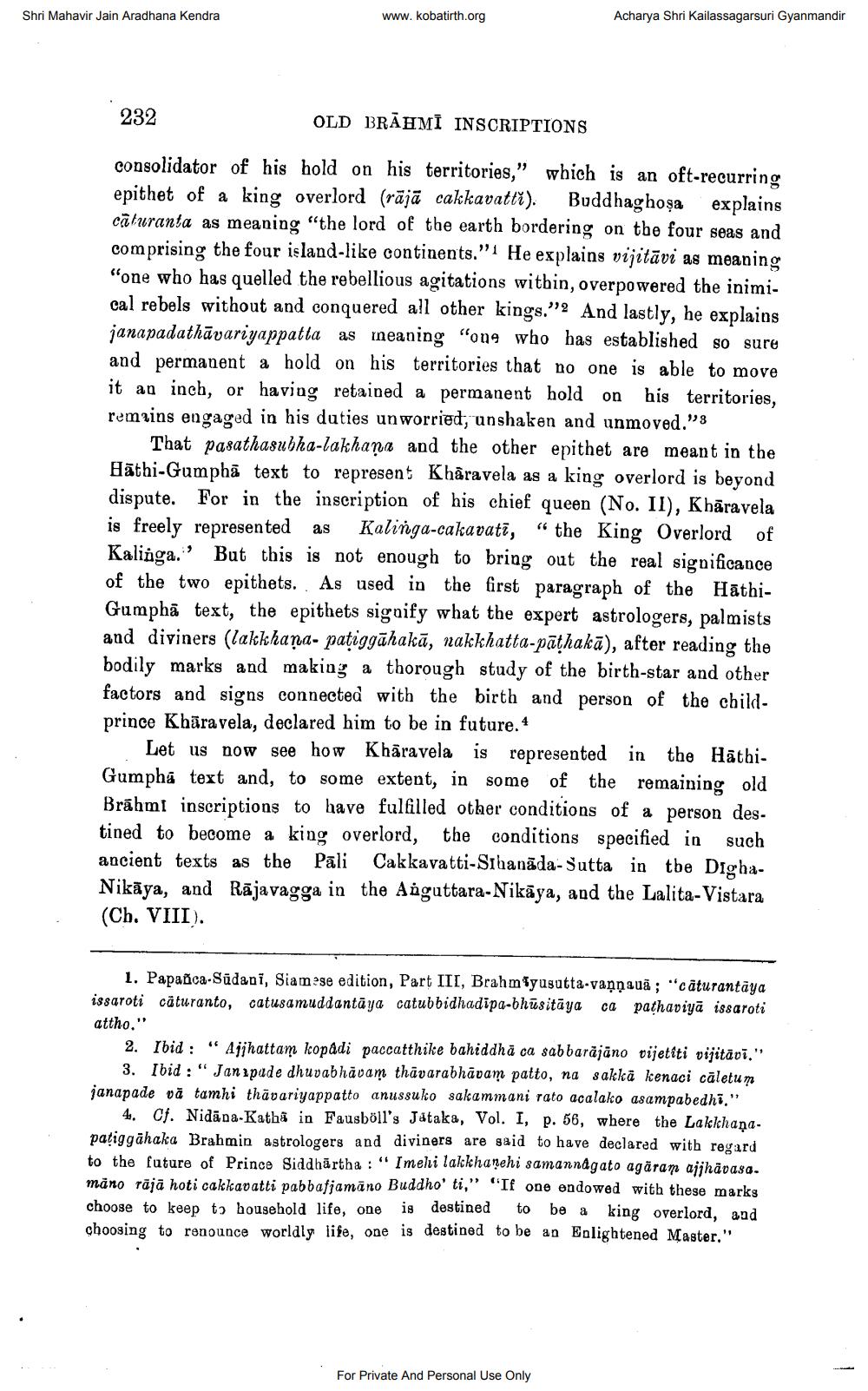________________
Shri Mahavir Jain Aradhana Kendra
www.kobatirth.org
232
OLD BRAHMI INSCRIPTIONS
consolidator of his hold on his territories," which is an oft-recurring epithet of a king overlord (räjä cakkavatti). Buddhaghosa explains caturanta as meaning "the lord of the earth bordering on the four seas and comprising the four island-like continents." He explains vijitāvi as meaning "one who has quelled the rebellious agitations within, overpowered the inimical rebels without and conquered all other kings."2 And lastly, he explains janapadathavariyappatta as meaning "one who has established so sure and permanent a hold on his territories that no one is able to move it an inch, or having retained a permanent hold on his territories, remains engaged in his duties unworried, unshaken and unmoved."8
Acharya Shri Kailassagarsuri Gyanmandir
of
That pasathasubha-lakhana and the other epithet are meant in the Hathi-Gumpha text to represent Kharavela as a king overlord is beyond dispute. For in the inscription of his chief queen (No. II), Kharavela is freely represented as Kalinga-cakavati, "the King Overlord Kalinga. But this is not enough to bring out the real significance of the two epithets. As used in the first paragraph of the HathiGumpha text, the epithets signify what the expert astrologers, palmists and diviners (lakkhana- paṭiggahaka, nakkhatta-pāṭhakā), after reading the bodily marks and making a thorough study of the birth-star and other factors and signs connected with the birth and person of the childprince Kharavela, declared him to be in future.1
Let us now see how Kharavela is represented in the HathiGumpha text and, to some extent, in some of the remaining old Brahmt inscriptions to have fulfilled other conditions of a person destined to become a king overlord, the conditions specified in such ancient texts as the Pāli Cakkavatti-Sihanada-Sutta in the DighaNikaya, and Rajavagga in the Anguttara-Nikaya, and the Lalita-Vistara (Ch. VIII).
1. Papañca-Sudani, Siamese edition, Part III, Brahmiyusutta-vanņaua; "caturantaya issaroti caturanto, catusamuddantaya catubbidhadipa-bhūsitāya ca pathaviya issaroti
attho."
2. Ibid: "Ajjhattam kopadi paccatthike bahiddha ca sabbarajāno vijetiti vijitāvī." 3. Ibid: "Janapade dhuvabhavam thavarabhavam patto, na sakka kenaci caletum janapade va tamhi thavariyappatto anussuko sakammani rato acalako asampabedhi."
4. Cf. Nidana-Katha in Fausböll's Jataka, Vol. I, p. 56, where the Lakkhanapaṭiggähaka Brahmin astrologers and diviners are said to have declared with regard to the future of Prince Siddhartha: "Imehi lakkhanehi samannagato agaram ajjhävasa. mano rajā hoti cakkavatti pabbafjamano Buddho' ti," "If one endowed with these marks choose to keep to household life, one is destined to be a king overlord, and choosing to renounce worldly life, one is destined to be an Enlightened Master."
For Private And Personal Use Only




